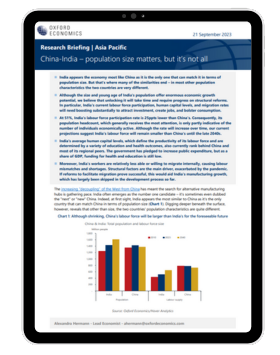China-India: population size matters, but it’s not all

India appears the economy most like China as it is the only one that can match it in terms of population size. But that’s where many of the similarities end – in most other population characteristics the two countries are very different.
This is the first piece in our series of Research Briefings comparing the Chinese and Indian economies. Click here to read the second piece.
What you will learn:
- Although the size and young age of India’s population offer enormous economic growth potential, we believe that unlocking it will take time and require progress on structural reforms.
- At 51%, India’s labour force participation rate is 25ppts lower than China’s. Consequently, its population headcount is only partly indicative of the number of individuals economically active.
- India’s average human capital levels also currently rank behind China and most of its regional peers.
- India’s workers are relatively less able or willing to migrate internally, causing labour mismatches and shortages. If reforms to facilitate migration prove successful, this would aid India’s manufacturing growth.
Tags:
Related Posts

Post
The rise of Southern India’s business service hubs
Over the next five years, India is set to be one of the fastest-growing major economies across Asia Pacific, lead by the performance of its IT and business services. The Southern states of Karnataka and Telangana are at the forefront of this success as they are home to two of India’s most rapidly growing cities and productive cities—Bengaluru and Hyderabad.
Find Out More
Post
India’s GST reform benefits durables, but far from a game changer
Research Briefing China-India: population size matters, but it’s not all
Find Out More
Post
Five lessons for businesses navigating tariffs and trade turmoil
In a rapidly evolving global trade environment, businesses must stay ahead of changing tariffs and regulatory demands. Our latest blog offers practical guidance on navigating tariffs, understanding key trade strategies, and leveraging accurate HS code classifications to optimize your supply chain. Explore essential insights that will help your business manage trade uncertainty, ensure compliance, and unlock new growth opportunities.
Find Out More